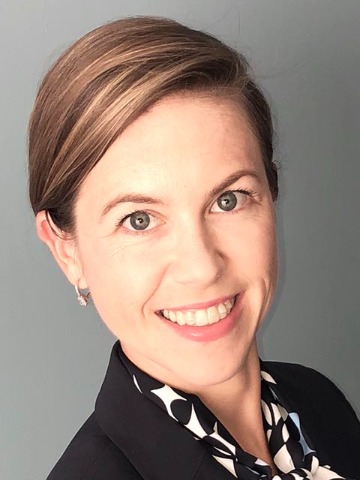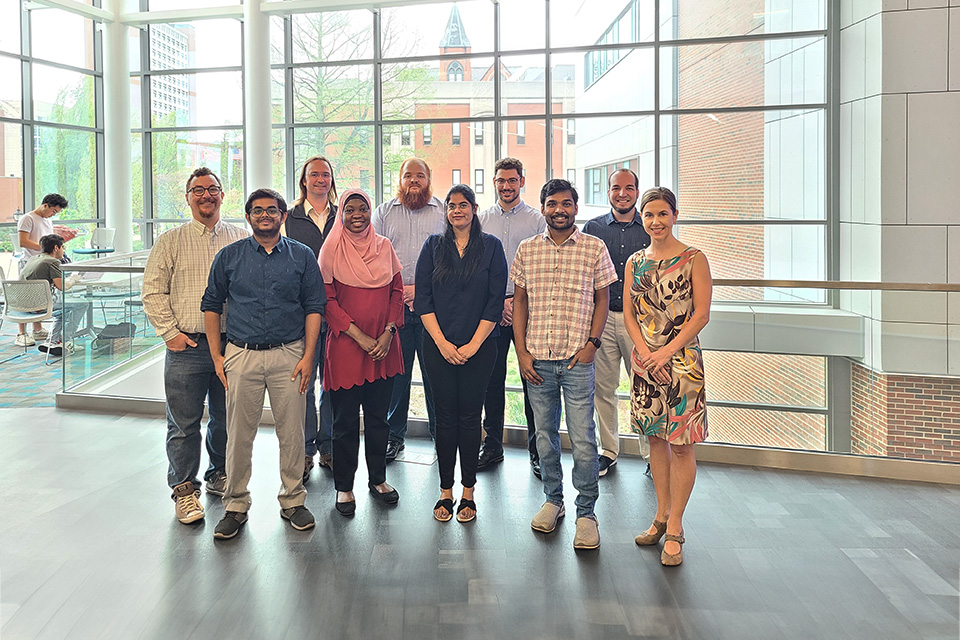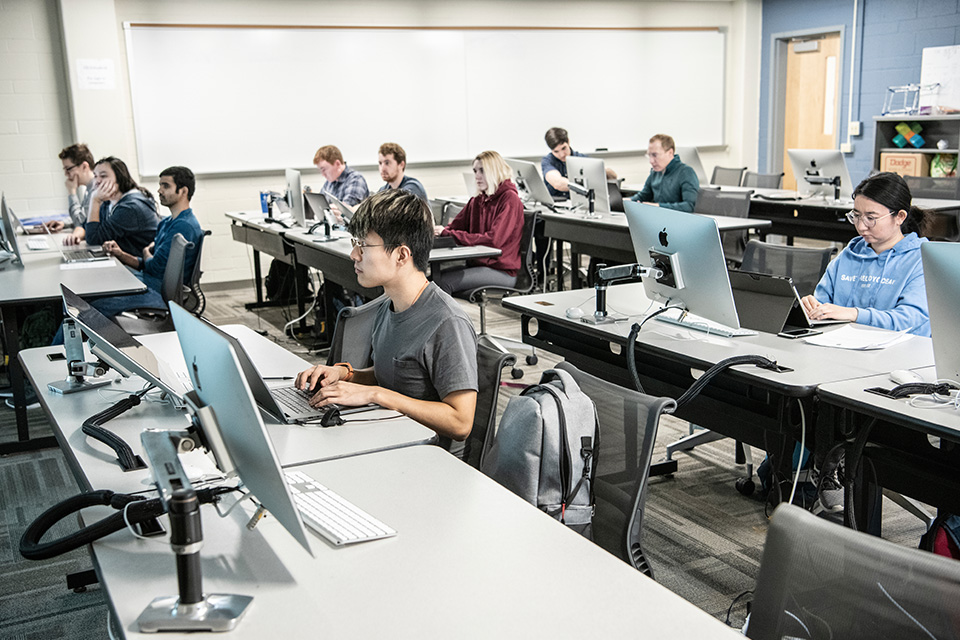Coding Careers and Accelerating Research
Discover how Open Source with SLU, a grant-funded initiative in Saint Louis University’s Department of Computer Science, is enhancing research efforts across the University and preparing students to enter today’s workforce with professional software development experience.
We can all recall a time when we brought an assignment home from school. Sometimes, it would take us hours, and other times, only minutes to complete before moving on to the next thing on our to-do list. This whole mentality — checking assignments off a to-do list like a routine — was something that bothered Kate Holdener, Ph.D., and assistant professor of computer science, when she considered her courses at Saint Louis University.
“What bothered me about [course] projects is that they were kind of toy projects or throw-away work,” Holdener said. “Students did the work, but it was not going to be used by anyone seriously or be maintained afterward. This felt like a waste because we have so many talented students that could be building something more useful.”
Holdener is a professional software engineer specializing in software engineering, software development, and evolutionary algorithms. In early 2022, she received a two-year grant from the Alfred P. Sloan Foundation to create a center that would engage graduate and undergraduate students in open-source software development for SLU research projects. She founded the program called Open Source with SLU.
“I wanted to give students a more realistic environment for software development and also support the faculty that are doing research at SLU,” Holdener said.
“This grant opportunity was looking to support various initiatives that help train a better workforce in open source because it is one of the reasons we have such rapid technological advancement [today]," she said.
Software in the Open

For every piece of technology or automation, a piece of source code is needed to make it function. Once it is ready for release, the creator of the code must answer an essential question: Will the code be closed or open to the public?
The difference between closed and open-source code is in the name itself: It’s either open or closed to public visibility and modification. Open source allows anyone to adjust the code and collaborate to improve performance. It’s a critical learning opportunity for students interested in computer science.
Holdener explained that using open source has an added benefit on university campuses where students' availability and involvement may change from semester to semester.
“We don’t have to reinvent,” she said. “Instead of writing the code from scratch [each semester], we’ll use a library, put code together, and write our own code from there.”
Open Source with SLU gives participating students practical software development experience and helps researchers with their custom software needs. Holdener structured the program to allow SLU researchers to submit a formal request for a software project, and then graduate students lead a team of undergraduate students to execute the work. Graduate students are hired to take on the role of a senior developer, overseeing all stages of the project and checking in with undergraduate developers along the way.
The program has a collaborative atmosphere. Students must develop an actionable plan that includes designing, prototyping, testing and showcasing their work to their clients — much like a corporate software development team. Yet, the greatest takeaway for students is that their capstone project can now be used as professional experience in a job interview.
“Students make contributions to these projects, and all those contributions are visible to anybody,” Holdener said. “As a potential employer, I can go and look at your profile and see these are the things you have worked on and these are the lines of code you wrote. It gives [students] a concrete foundation and proof of what they worked on."
Purpose-Driven Projects
In its first year of operation, Open Source with SLU has contributed to research projects on campus and in the St. Louis community. While each project is research-driven, they are also purpose-driven, developing software that will benefit humanity in the long term. This supports the program’s three learning outcomes that guide student work on their projects — experience, service and promotion.
Daniel Shown, program director for Open Source with SLU, explained that students are
able to achieve these goals and gain professional experience as they support research
that is interesting or valuable to them.
“First, we are trying to give students real-world software development experience,”
he said. “Something more like what they will experience when they are out in the world
and less like a class assignment. Second, we are building software that supports research,
so we pick clients from across the University who are doing research. The third thing
we are trying to do is promote and be a center of gravity for open-source software
development and broader conversations about open scholarship on campus.”
At the time of this publication, the program is working on over 13 capstone projects that contribute to research in fields such as mathematics, statistics, chemistry, theology, history and community improvement. One community improvement project includes their recent work with an application that simplifies the process of volunteering at local homeless shelters. This project is in partnership with House Everyone STL.
“This project is a website, where volunteers can easily sign up for shifts at homeless shelters,” said Logan Wyas, SLU graduate student and developer on the project. “It has the ability to make a big impact on our world.”
The application will allow volunteers to sign up, view which shelters have open volunteer shifts, and give shelters the ability to see who is on their schedule. For students, it is the opportunity to address real-world problems in research or the local community that most excites them. When they see the skills they’ve learned in the classroom give them the power to improve the world around them, it makes the work all the more meaningful.

Another mission-driven project is called the Lived Religion Project, which wanted a digital platform that would share media and notes about people’s respective encounters with religion in their everyday life.
“Dr. Adam Parks does research in ethnography, which is how people live, and he is specifically focused on religion and the different ways people experience or engage in religion or religious artifacts,” Holdener said. “He needed a platform that would allow ethnographers to go out in the world, make notes on various religious artifacts, and come home to make more detailed notes after.”
This need developed into the idea for “Where’s Religion?” an application for both desktop and mobile that hosts a platform for collecting, organizing and sharing images, videos and sounds, along with textural notations sourced from a wide range of users. This collection of materials will not only give value to research stemming from history and religion, but also will provide a unique look at several viewpoints of American life.
Undergraduate student Massimo Evelti works on multiple projects within the program to further develop his skills, expand his knowledge of open source, and connect with classmates in a working environment. He said their roles as computer scientists and engineers within Open Source with SLU have an inherent capability to better the world now and into the future.
“Engineering is about creating things to help people, and many of these projects are for the betterment of society and its people,” Evelti said. “If one puts helping others as a priority, there will be plenty of moments to flourish in this field.”
Embracing a Collaborative Environment
Open Source with SLU requires a team effort, which is an expectation that not many of the students face in their other courses. Shown explained that the way scientists work across disciplines is more collaborative than ever, and putting the open-source work out into the community benefits all.
Holdener built the program to foster a collaborative approach when working on open-source projects. Graduate and undergraduate students come together with their unique interests, varying experience levels, and personal skills to gain the experience they need to move into their careers beyond SLU.
Graduate student Yash Bhatia received his undergraduate degree in computer engineering in 2019 from Mumbai University in India before coming to SLU to obtain his master’s in computer science. He works at Open Source with SLU as a graduate assistant and tech lead for open-source projects, including the “Where’s Religion?” desktop and mobile applications.
Bhatia believes the program helps students gain valuable experience working in a team environment that will prepare students for a career after graduation.
“There are many students who come to the United States with no experience working on real projects or real-time group efforts, where a group leader shapes the team and helps them to become better developers,” Bhatia said. “Open Source with SLU is an excellent initiative that builds skills and makes students learn about different technologies.”
Holdener explained that the program gives students an edge in their resumes. She said most entry-level computer science positions require one to two years of experience, which makes it more challenging for a student entering the job market. This program presents a solution for students — helping them gain relevant and provable experience before entering an interview.
“Whether it's these projects or some other projects, [students] can claim some experience through it,” she said. “Also, it's not just the claim — it's something [they] can demonstrate. I tell my students to list and link their projects on their resume because it’s their development. We run this program in a professional manner just like any software development organization.”
Toward the Discovery of the New

Open Source with SLU is making an immediate impact with computer science students across campus, inviting them to dive into their chosen craft with vigor, innovation and creativity. However, it's not just for students who work in coding and engineering software, but also for students who may have an interest in learning about open-source software.
“A long-term goal for me is to involve students at different levels in the program, and not necessarily from just the computer science department,” Holdener said. “There’s many aspects to these projects that are less technical, and it could be a playground where all students can come, jump in and participate in projects.”
Current students encourage others to reach out and become involved in what projects pique their interest.
“This program is an amazing initiative,” Evelti said. “I highly recommend students to look through the projects, and if there is one that catches your eye, dive in and start with the easiest problem. From there, you will start to understand what you are good at and what you need to work on. The important thing is don’t be timid to ask for help and to finish a problem you have started!”
As Open Source with SLU continues to grow, Holdener is optimistic that this initiative is just the start of an impactful, flourishing open-source community at SLU.
“Students hear about this, and they’ll reach out to say ‘Hey, how do I get involved in this? I want to build up my skills and participate,” she said. “We’re seeing more of this now, and it is exciting to me.”
To learn more about the current projects or to submit a project request to Open Source with SLU, visit their website at https://oss-slu.github.io/.
Story by Mary Pogue, senior copywriter, Paradigm.
This piece was written for the 2023 SLU Research Institute Annual Impact Report. The Impact Report is printed each spring to celebrate the successes of our researchers from the previous year and share the story of SLU's rise as a preeminent Jesuit research university. Design, photography, and some writing contributions are made by Paradigm. More information can be found here.

















